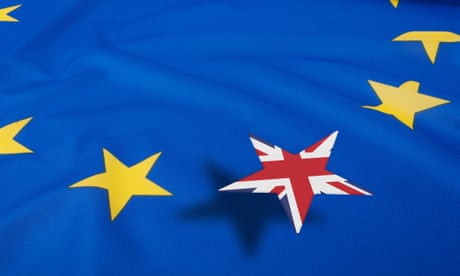Latest Brexit policy paper leaves open possibility of European court of justice retaining say on UK law
 The shadow Brexit secretary, Keir Starmer, said European judges would have to be involved in a system to address Brexit issues. Photograph: Stefan Rousseau/PA
The shadow Brexit secretary, Keir Starmer, said European judges would have to be involved in a system to address Brexit issues. Photograph: Stefan Rousseau/PA
T
Theresa May was accused of a climbdown over the future sovereignty of British courts after a newly published government paper appeared to leave open the possibility that the European court of justice would influence UK law after Brexit.
The latest of a flurry of Brexit policy papers, due to be published on Wednesday, will repeat the government’s insistence that the “direct jurisdiction” of the Luxembourg-based ECJ must end when Britain leaves the EU in March 2019.
But it will set out a range of options for resolving future disputes between Britain and the EU – over the rules of any new trade deal, for example – some of which are likely to involve European judges, or the application of ECJ case law.Q&A
What is the European court of justice (ECJ)?Show
A UK government spokesperson said: “We have long been clear that, in leaving the EU, we will bring an end to the direct jurisdiction of the court of justice of the European Union in the UK.”
The spokesperson added: “It is also in everyone’s interest that, where disputes arise between the UK and the EU on the application or interpretation of these obligations, those disputes can be resolved efficiently and effectively.”
Judicial independence is a totemic issue for Brexiters, and May sought to reassure them in her Lancaster House speech in January that she would “take back control of our laws and bring an end to the jurisdiction of the European court of justice in Britain”.
She added: “Leaving the European Union will mean that our laws will be made in Westminster, Edinburgh, Cardiff and Belfast. And those laws will be interpreted by judges not in Luxembourg but in courts across this country.”
Advertisement
Opposition politicians said that the paper represented a U-turn by ministers. The shadow Brexit secretary, Keir Starmer, said: “The repeated reference to ending the ‘direct jurisdiction’ of the ECJ is potentially significant. This appears to contradict the red line laid out in the prime minister’s Lancaster House speech and the government’s white paper, which stated there could be no future role of the ECJ and that all laws will be interpreted by judges in this country.”
Chuka Umunna, a Labour MP and supporter of the Open Britain group said: “Nothing the government says it wants to deliver from Brexit – be it on trade, citizens’ rights or judicial cooperation – can be achieved without a dispute resolution system involving some role for European judges.”
The Liberal Democrat leader, Vince Cable, said: “We welcome this sensible and long overdue climbdown by the prime minister. It shows Theresa May’s red lines are becoming more blurred by the day.
“The government seems to have belatedly accepted it won’t be possible to end the EU court’s influence in the UK without damaging our free trade and security cooperation with Europe.”
Senior sources at DExEU denied that they were planning a retreat on the principle of judicial sovereignty – but as the government has laid out more details of the “deep and special partnership” it hopes to negotiate after Brexit, it has become clear that the UK and the EU will not diverge significantly.
Analysis Breaking with the European court of justice won’t be easy for Britain
Eurosceptics want to ‘take control’ – but if the UK wants to maintain close links with the EU, it will need a compatible legal system
Read more
That is likely to mean shadowing EU law in some significant areas and legal experts have warned that will make it difficult to avoid a key role for the ECJ.
Sir Paul Jenkins, who was the government’s most senior legal official for eight years until 2014, said at the weekend that the prime minister’s policy of seeking to avoid ECJ involvement was “foolish”. He insisted that if the UK wanted to retain close links with the single market and customs union it would have no option but to observe EU law “in all but name”.
Wednesday’s paper is likely to point to precedents for international dispute resolution that do not involve a direct role for the Luxembourg court, including disputes between Switzerland and the EU, which are settled through a series of joint committees – though the EU is unhappy with that arrangement, and would like a more judicial approach.
It will also use the example of the Canadian free trade deal, Ceta, which includes an investor-dispute mechanism involving expert arbitrators, rather than judges. That would be controversial with campaigners concerned that such a body may be more opaque and less consistent than a court.
The paper will not identify a preferred model, but will stress that the government is willing to be flexible, and could consider the creation of new arbitration bodies for different types of dispute.
Yes, Ceta is a gold-standard trade deal – for North America’s corporations
Stuart Trew
Read more
Britain’s objection to ECJ oversight has already become a sticking point in talks with Brussels, with the EU insisting that it sees the Luxembourg-based court as the best arbiter of future disputes over the rights of the EU citizens who currently live in Britain. The government will underline on Wednesday that it still believes UK courts should be the guarantors of these rights – and EU courts for British citizens living abroad.
Advertisement
Tory MP and leading Leave campaigner Bernard Jenkin said: “The ECJ should not have any role in interpreting any agreement between the EU and the UK.”
He told the Daily Telegraph: “No non-EU country will be much interested in talking to us about a free trade agreement if we still look hobbled by our relationship to the EU.”
Another political hurdle to a successful Brexit deal was made clearer on Tuesday when the Welsh first minister, Carwyn Jones, and his Scottish counterpart, Nicola Sturgeon, announced they would be jointly drawing up amendments to the government’s EU (withdrawal) bill, in a bid to ensure that powers returned from Brussels flow to Edinburgh and Cardiff, not Westminster.
The pair had already pledged to withhold consent from the legislation, triggering a constitutional crisis, unless it is amended. After meeting Sturgeon in Edinburgh, Jones said: “The Welsh parliament is never going to support something that deprives the people of powers that would otherwise come to them.” He added: “The UK government has not done enough to build trust.”
May has not been fronting the publications of the Brexit position
papers, after a low-key summer in which she spent almost four weeks on holiday. She returned last week but only made one public appearance, in Portsmouth, where she welcomed the aircraft carrier HMS Queen Elizabeth to its home port for the first time.

The Guardian's Brexit Means ... The three ‘whats’ of leaving the EU – Brexit Means podcast
The team look at what kind of transition Britain wants, what might be in the government’s position papers and what size of divorce bill Brexiters are willing to pay
Listen
After spending time working from her constituency earlier in the week, May will reappear in the public eye on Wednesday at a factory that makes red double-decker buses in Guildford, Surrey. She is visiting the Alexander Dennis site to announce £44m of government financial guarantees to enable the sale of 90 low-emission vehicles to Mexico City.
However, the prime minister will not address staff at the factory for a speech or question and answer session, and journalists will not be allowed to attend apart from a shared broadcast camera.
Before the visit, she said the guarantee was a sign the UK was “building a truly global Britain by helping UK companies win multimillion-pound contracts to export their products across the globe, and supporting high-value jobs here in this country”.
Jeremy Corbyn, the Labour leader, will spend the day campaigning in the Western Isles as part of his tour of Scotland this week. He will be visiting a Harris tweed mill, an education organisation which helps with broadband connections, meeting business and community leaders, and visiting an art exhibition, followed by a rally at a sports centre where about 1,000 people are expected.




No comments:
Post a Comment